What is aphasia and how is it linked to dementia or stroke? What are the signs and who's prone to it?
How are the three neurological conditions linked? And why do chatting and singing help aphasia patients?
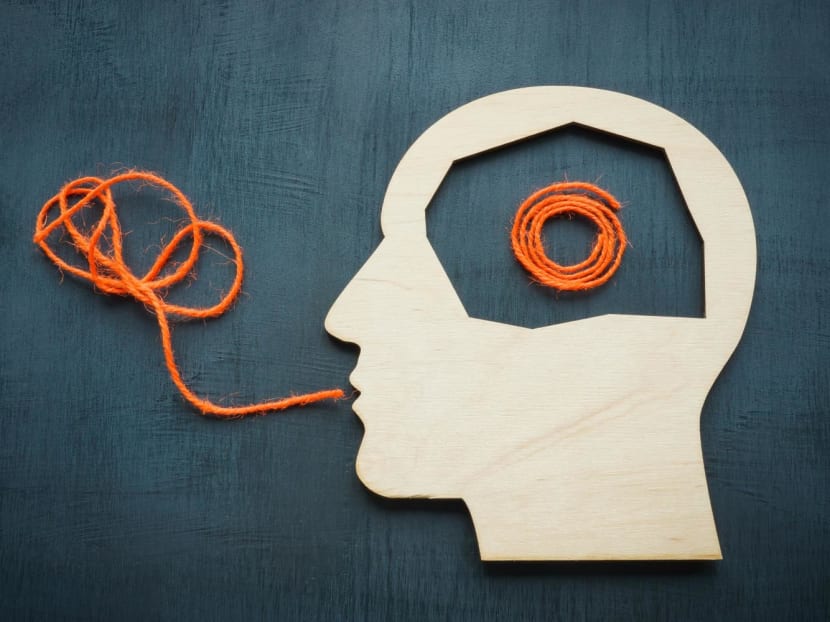
Aphasia affects the patient's communication capabilities but not his intellect. (Photo: iStock/designer491)
If it wasn’t for Bruce Willis’s diagnosis and his family’s subsequent announcement in March this year that the actor would be stepping away from acting, chances are, many people wouldn’t have been aware aware of the condition called aphasia.
In Singapore, there was local playwright Lim Hai Yen, wife to Member of Parliament Baey Yam Keng, and the news she was also diagnosed with aphasia following a stroke. And she is not alone as seen in the recent CNA story about living with aphasia in Singapore.
According to the Singapore Stroke Registry in 2019, about 3,000 new cases of aphasia are diagnosed every year. Non-profit organisation Aphasia SG, for instance, has about 160 patients and caregivers in its support group.
But what exactly is aphasia and how is it different from other neurological issues such as dementia or stroke? Here’s an FAQ with the experts.
WHAT IS APHASIA?
Aphasia is a neurological condition that affects the parts of the brain that control language, explained Dr Chiew Hui Jin, a consultant with National Neuroscience Institute’s Department of Neurology. “This leads to difficulty with communication.”
The damage is often on the left side of the brain, which is “important for understanding and producing language”, said Dr Emily Guo, a principal speech therapist at the Department of Rehabilitation at National University Hospital (NUH). “It can affect speaking, listening, reading and writing.”
Aphasia’s causes can include stroke, brain tumour, traumatic brain injury, infections or inflammations of the brain, dementia or progressive neurological disorders, said Dr Guo, who is also an associate professor with the Singapore Institute of Technology's Health and Social Sciences cluster.
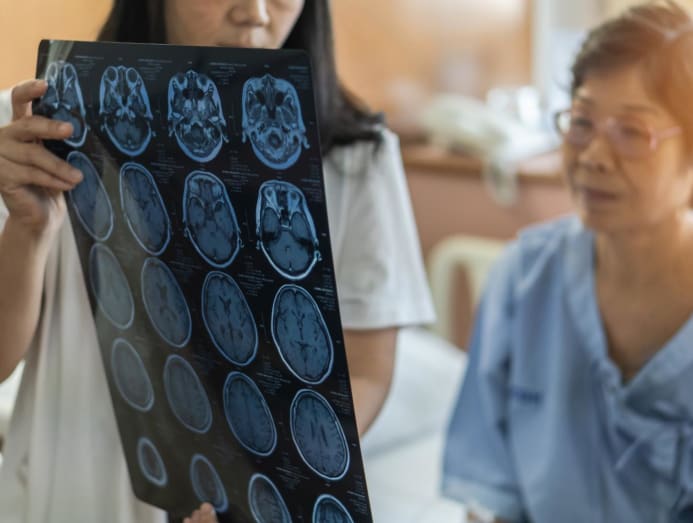
ARE THERE DIFFERENT TYPES OF APHASIA?
Generally, aphasia can be grouped into three main categories: Expressive, receptive and global aphasia, according to Dr Chiew.
“In expressive aphasia, the patient may have difficulty expressing himself and may speak in incomplete sentences, and experience difficulty in word-finding or writing,” he said.
Those with receptive aphasia may have difficulty with language comprehension. They may not be able to follow or understand conversations, or they may demonstrate a sudden inability to read. “A person with global aphasia typically has difficulty with all of the above functions,” he said.
However, this does not mean that the patient’s intellect is affected, according to Aphasia SG.
HOW IS APHASIA LINKED TO STROKE?
A stroke occurs when something blocks the blood supply to a part of the brain or when a blood vessel in the brain bursts. In both instances, the brain cells can’t get their supply of oxygen and start to die within minutes, leading to what we know as a stroke.
It goes to stand that if the blockage or rupture occurs in the brain’s left hemisphere, where the language centre sits, it can cause aphasia. In fact, one third of all stroke survivors suffer from aphasia, according to Aphasia SG.
HOW IS APHASIA DIFFERENT FROM DEMENTIA? CAN BOTH CONDITIONS OCCUR AT THE SAME TIME?
Dementia is a neurological disease that affects a person's cognitive functions, of which language and memory are examples, explained Dr Chong Yao Feng, an associate consultant at NUH’s Division of Neurology.
However, “the most common cognitive function to be lost in dementia is memory rather than language”, he said. “This is why the layperson’s common picture of dementia is that of an elderly person who is forgetful.”
But can there be a link between dementia and aphasia? According to Dr Guo, dementia involves brain degeneration in multiple parts of the brain. “If the language areas are impacted, aphasia will occur as well.”
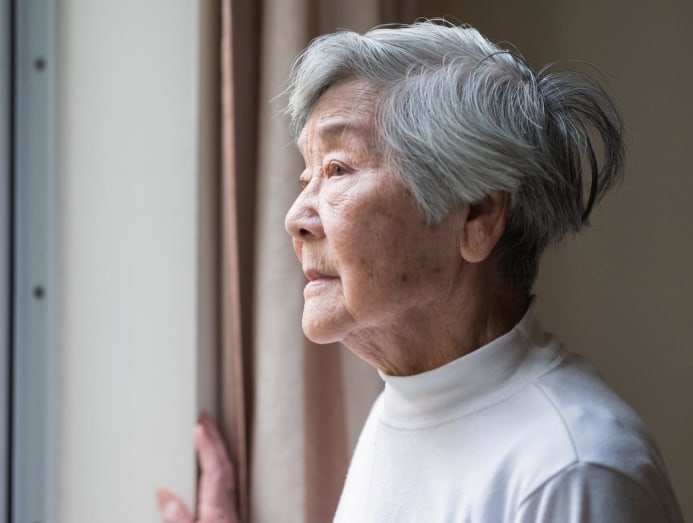
As for how frequently that co-occurrence happens, Dr Chong noted that he sees about three out of 100 patients with dementia, based on his clinical experience. “I would qualitatively say that aphasia is not commonly seen in the early stages of dementia. But as the dementia progresses to later stages, aphasia becomes common.”
The link between dementia and aphasia is also more pronounced in primary progressive aphasia (PPA), which is a specific type of dementia, said Dr Chong. “PPA is very different from the other types of dementia in that it presents with aphasia in the early stages.” He is not aware of statistics but commented that PPA is rare in Singapore.
WHO IS PRONE TO DEVELOPING APHASIA? WHAT ARE THE EARLY SIGNS AND RISK FACTORS?
“There is no typical patient profile as it depends on the cause of aphasia. If the cause is due to stroke and degenerative diseases, the risk increases with age,” said Dr Guo.
In instances where aphasia is caused by a stroke or traumatic brain injury, there is no early warning sign that we can look out for, she said. “Aphasia’s onset is sudden and acute in these cases.”
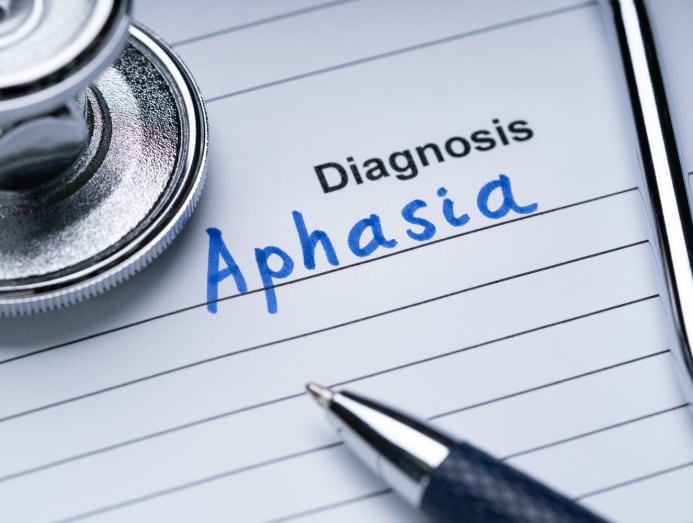
If aphasia is caused by degenerative conditions such as dementia, the early signs may include difficulty in following conversations and finding the right words to express themselves, said Dr Guo. Such aphasia can deteriorate over time.
Added Dr Chong, the common causes of aphasia in Singapore are probably stroke and dementia. “Technically speaking, we can say that the ‘typical profile’ of a patient with aphasia is the same as the typical profile of someone who has stroke or dementia,” he said.
WHAT ARE THE ISSUES THAT PATIENTS FACE FROM NOT BEING ABLE TO COMMUNICATE AS WELL AS BEFORE?
Evelyn Khoo, the founder of Aphasia SG as well as a speech and language therapist, said that many aspects of the patient’s life are affected, including his career, which “can affect their sense of self-identity”.
Patients may also experience a loss of independence and sense of social isolation, she added. Activities that the patient used to be able to carry out on his own may now have to be done with the help of family members.
“I have witnessed first-hand the struggles my patients with aphasia experience doing everyday tasks like using WhatsApp or buying food at the hawker centre,” said Khoo. “Once, a hawker even raised her voice at my patient, who had difficulty ordering his food.”
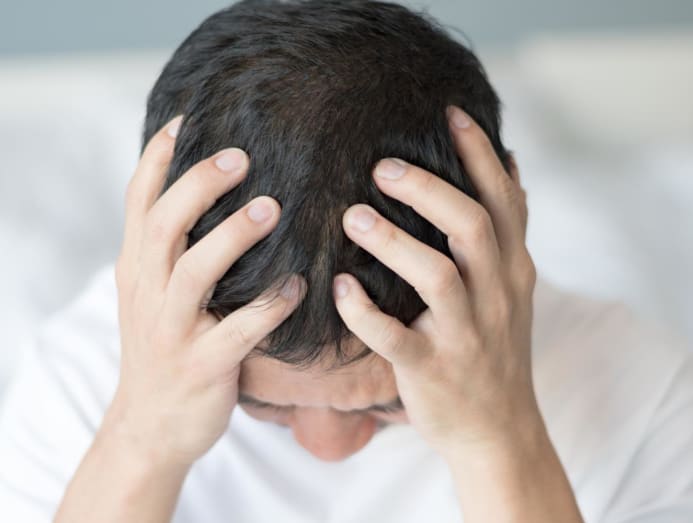
And when friends and loved ones do not understand the condition, the aphasia sufferer may feel socially isolated, she said. “Family members are often at a loss and struggle to communicate with their loved one who has the condition.
In fact, 93 per cent of aphasia patients suffer from psychological distress and depression as a result of the loss of independence and social isolation within the first six months of their stroke.
“Coupled with the fact that most mental health support relies heavily on communication, the person will find it difficult to seek psycho-emotional treatment,” said Khoo.
WHAT CAN PATIENTS DO TO RECOVER?
Speech and language therapy are key, said Dr Chiew. The recovery process depends on the cause of the aphasia, he said. In instances where the cause is stroke, traumatic brain injury or a brain tumour, the aphasia may “stabilise or even improve with treatment and time”.
“In aphasia caused by stroke, there can be some improvement in language, speech and communication over time aided by speech therapy,” said Dr Chiew. “However, in PPA, a neurodegenerative illness with similarities to dementia, there is no known cure for this currently.”
To help aphasia patients gain confidence to communicate with strangers or in groups, Aphasia SG has two programmes: Chit Chat Cafe and Aphasia SG Choir. “Our volunteers are trained to support and facilitate conversations for adults with aphasia, so that even those with severe impairment will feel included,” said Khoo, although she qualifies that these sessions do not constitute speech therapy and do not replace one-on-one therapy.
“Speech therapy is customised to the needs of the individual. (The Chit Chat Cafe) is additional support for those who want more practice and wish to get to know others facing similar struggles.”
As for the benefits of singing, Khoo explained that “Music and rhythm activate the uninjured right hemisphere of their brains to facilitate verbal expression”.
Are certain music genres more helpful than others? “I am not sure if a certain musical genre is superior, but our songs are selected by music therapists and musical volunteers based on the preferences of our participants with aphasia,” she said.






